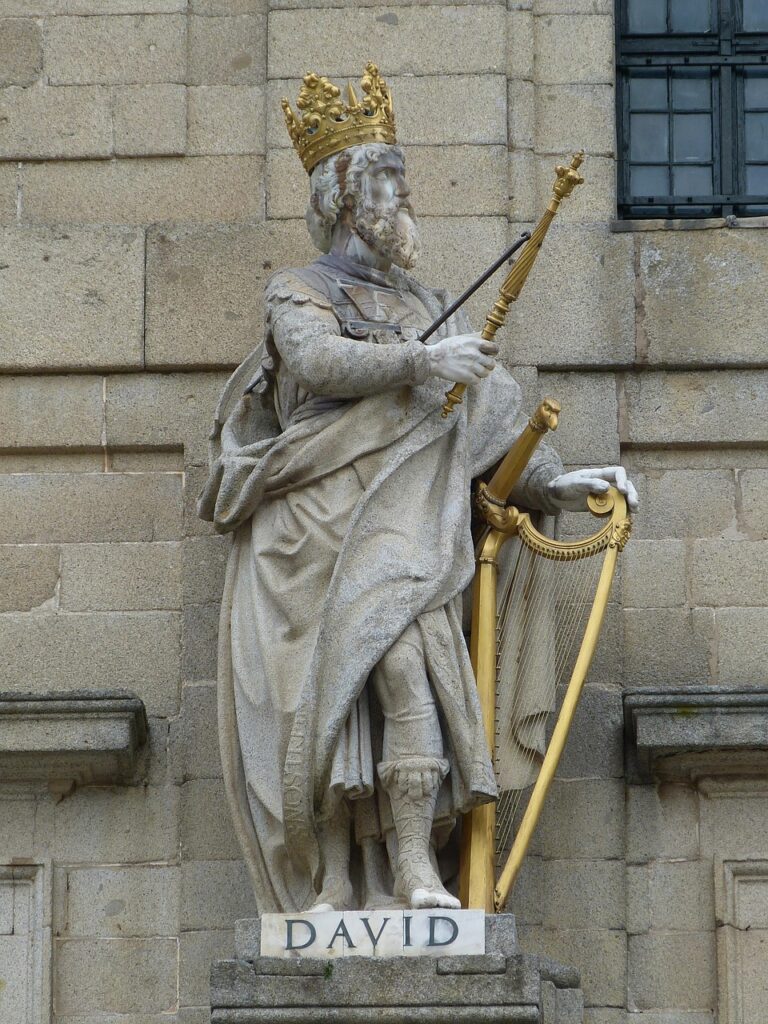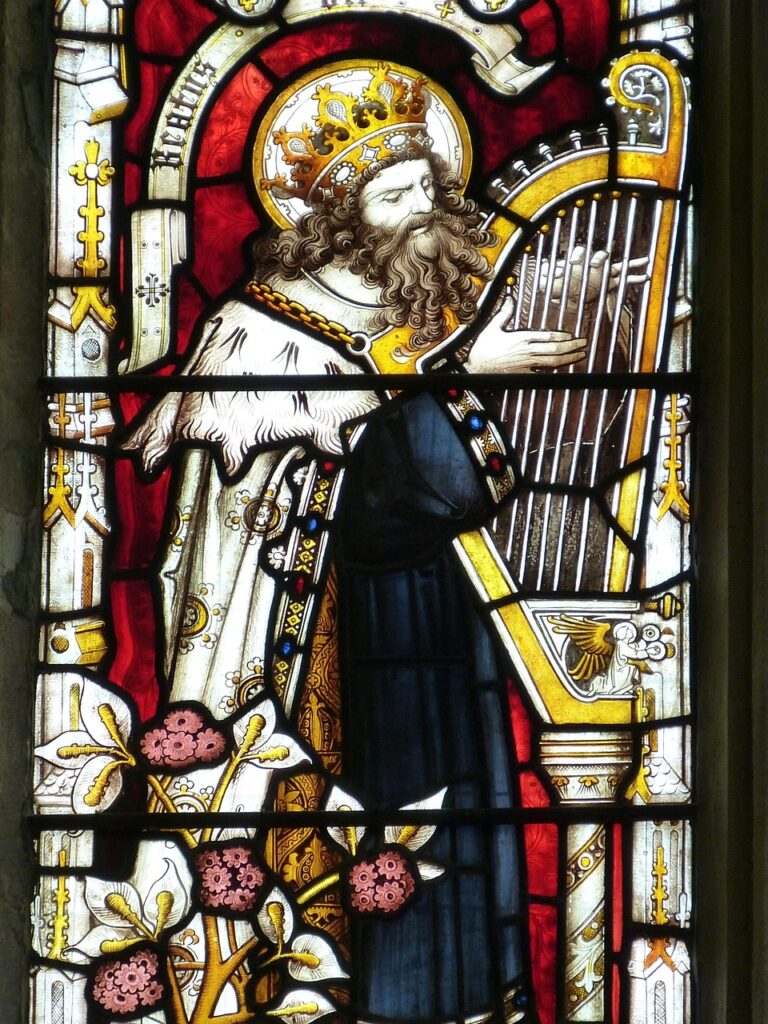
King David is a significant figure in biblical history and tradition. He is known as a warrior, a poet, and a king. His life and reign are detailed in the Old Testament, particularly in the books of Samuel, Kings, and Chronicles. David’s legacy continues to impact cultures and religions worldwide, making him an enduring symbol of leadership and faith.
Early Life and Background
David was born in Bethlehem, in the tribe of Judah, around 1040 BCE. He was the youngest of eight sons of Jesse, a shepherd. His early life involved tending to sheep, which instilled in him a sense of responsibility and leadership. Despite being the least likely candidate, David was chosen by God to be the future king of Israel. This divine selection came through the prophet Samuel, who anointed David with oil, marking the start of his extraordinary journey.
Growing up, David developed skills that would serve him well later in life. He became adept at music, playing the harp beautifully. This talent caught the attention of King Saul, the first king of Israel. David’s music soothed Saul during times of distress, leading to an important relationship between the two. However, as David’s fame grew, so did Saul’s jealousy, setting the stage for conflict.
David and Goliath
One of the most famous stories about David is his battle with Goliath, a giant Philistine warrior. The Israelites were terrified of Goliath, who challenged them to send a champion to fight him. David, still a young shepherd, volunteered to take on the giant. Armed with only a sling and five smooth stones, he approached Goliath with unwavering faith in God.
In a dramatic confrontation, David defeated Goliath with a single stone, striking him down. This victory not only showcased David’s bravery but also demonstrated his deep faith in God. The story of David and Goliath symbolizes the triumph of the underdog and has inspired countless individuals throughout history to face their fears and challenges with courage.
Rise to Power

Following his victory over Goliath, David’s popularity soared. He became a military leader in Saul’s army and led many successful campaigns against Israel’s enemies. However, Saul’s jealousy intensified, leading to a deadly rivalry. David was forced to flee, becoming a fugitive. During this time, he gathered a group of followers and continued to fight for Israel, all while maintaining his faith.
After Saul’s death, David was eventually anointed king of Judah. Later, he became the king of all Israel, uniting the tribes and establishing Jerusalem as the nation’s capital. His reign was marked by significant military victories, territorial expansion, and the consolidation of power. David’s leadership transformed Israel into a powerful nation, establishing a legacy that would last for generations.
David as a Leader
David’s leadership style was multifaceted. He was a warrior king, known for his military prowess and strategic thinking. David led his armies into battle and was often on the front lines. However, he was also a compassionate ruler who cared for his people. He sought justice, showed mercy, and was known for his humility.
One of David’s most important contributions was his ability to unite the tribes of Israel. Before his reign, the tribes were often fragmented and at odds with each other. David’s leadership fostered a sense of national identity and purpose. He established a central government and created a strong military to protect the nation. This unity played a crucial role in Israel’s survival and success during his reign.
Spiritual Significance
David is often celebrated for his deep spiritual connection with God. He is credited with writing many of the Psalms, which express a range of human emotions, from joy and gratitude to sorrow and repentance. These poetic works have become central to Jewish and Christian worship, resonating with believers throughout the ages.
David’s faith was not without flaws. His life was marked by personal struggles and moral failures, including his infamous sin with Bathsheba. Despite his shortcomings, David’s genuine repentance and desire for reconciliation with God are often highlighted. His relationship with God exemplifies the idea that true leadership involves humility, accountability, and a willingness to seek forgiveness.
Legacy of King David
King David’s legacy extends far beyond his life. He is often regarded as the greatest king of Israel, and his lineage is significant in both Jewish and Christian traditions. According to the Bible, the Messiah is prophesied to come from David’s line, making his family tree vital to religious beliefs.
David’s influence can be seen in various aspects of culture, art, and literature. His life story has inspired countless works, from paintings to music, and his character continues to be a subject of fascination. The values he embodied—courage, faith, and leadership—remain relevant, offering timeless lessons for individuals today.
David in Jewish Tradition

In Jewish tradition, King David is a central figure. He is celebrated during various religious observances and is often invoked in prayers and blessings. The concept of the Messianic king is closely tied to David, emphasizing his importance in Jewish eschatology. His reign is viewed as a golden age of Israel, and he is often remembered as a model of righteous leadership.
Moreover, David’s story is included in Jewish teachings and texts, serving as a source of inspiration and moral guidance. His psalms are recited in prayers, and his life is studied for its lessons on faith, repentance, and the complexities of human nature.
David in Christian Tradition
For Christians, King David holds a significant place in the New Testament. He is mentioned frequently, and the genealogy of Jesus traces back to David, emphasizing the fulfillment of the prophecy regarding the Messiah. David’s life and experiences are often seen as a foreshadowing of Christ’s own life, particularly in terms of suffering, leadership, and the call to serve.
Additionally, the Psalms attributed to David are integral to Christian worship and spirituality. They are used in liturgy, prayer, and personal devotion, reflecting the deep emotional and spiritual struggles that believers face. David’s relationship with God is a model for Christians, illustrating the importance of faith, trust, and repentance.
Conclusion
King David’s life and legacy are of immense importance in both religious and cultural contexts. As a warrior, leader, and poet, he exemplifies qualities that resonate with people across generations. His story is one of triumphs and failures, faith and doubt, making him a relatable and enduring figure. David’s impact on history, religion, and culture continues to inspire and teach valuable lessons about leadership, humility, and the human experience. His legacy as a king, poet, and man of faith ensures that his story will be told and celebrated for years to come.
FAQs
What was the significance of David’s anointing as king?
David’s anointing by the prophet Samuel marked him as God’s chosen leader for Israel, establishing a divine right to rule that would shape the nation’s future.
How did David’s early life influence his leadership style?
David’s experiences as a shepherd taught him responsibility, resilience, and the importance of caring for his people, qualities that defined his leadership.
Why is the story of David and Goliath so popular?
The story symbolizes the triumph of the underdog and faith over seemingly insurmountable challenges, inspiring individuals to face their fears.
What role did David play in the establishment of Jerusalem?
David conquered Jerusalem and made it the capital of Israel, unifying the tribes and establishing a central place of worship and governance.
How are David’s psalms relevant today?
David’s psalms express a wide range of human emotions and experiences, making them relatable and meaningful in personal and communal worship contexts.






